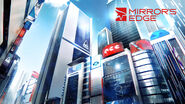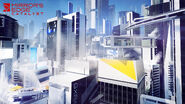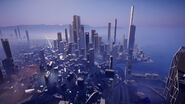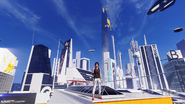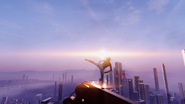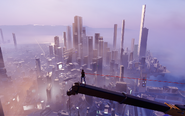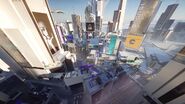
City of Glass
Overview[]
The City of Glass is a city located to the far south of Cascadia Prime, and is the setting of Mirror's Edge: Exordium and Mirror's Edge Catalyst.
Glass stands as a pristine symbol of Conglomerate greatness – the very antithesis of the featureless OmniStat architecture. Silvine maintains a strong presence in this city where the hiCaste almost outnumber the midCaste, and as the ultimate achievement of Conglomerate architectural ingenuity Sky City stretches to the clear skies, a tangible reminder of the rewards to be reaped for those willing to make the necessary sacrifices.
Though located to the far south of Cascadia Prime, the coastal city of Glass is the exact opposite of the sleepy fishing town many Cascadians believe it to be. As one of two development hubs for Silvine Systems, Glass stands at the forefront of the digitized revolution sweeping through our nation. And as the third biggest city in Cascadia, Glass holds its own in terms of entertainment and shopping. The annual Ocean View Regatta attracts hundreds of thousands of visitors, and many end up sending in relocation requests to their HR departments after having enjoyed the vast beaches and refreshing coastal climate. And for the lucky few who get to visit Sky City there is really no going back.
But the Regatta is not the only reason to come to Glass. With its mix of peculiar SSSC influences, relaxed beach-resort attitude and highly educated and discerning citizenry, Glass remains an attractive location all year round. The night-life is vibrant, the restaurants specialize in exotic sea-food and the shopping is on par with what one can find in Cascadia Prime.
Last but not least Glass stands as a model city for the ongoing reconstruction effort launched in FY36. CC Corp has been instrumental in refurbishing the entire city into the pristine pinnacle of reflective beauty which greets all citizens every morning. Once you've witnessed a sunrise splinter into a cascade of light in the Crystal Gardens District or seen the myriad of avant-garde buildings in “The Anchor” glitter like polished gems you’ll never quite be the same again.
History[]
The foundations of what we today know as Glass were laid centuries ago. For hundreds of years it remained a small seaside village, focused on fishing and boat building, but as the tech-reformation was ushered in, Glass began to attract small software developers looking for cheap living in a great location away from the overcrowded megacities of the day. The village grew into a town which then blossomed into a small city, but due to the many shortcomings of the governmental system back then crime soon ran rampant, and as the country moved on into the Years of Unrest and the Agglomerate Wars the population suffered badly.
The lost years of OmniStat rule didn’t help the situation. The city came to be known only as SE-31 in reference to its south-eastern location, all development ground to a halt and it wasn’t until after the Kruger Uprising that the region began to grow again, with the promise of free enterprise attracting a slew of ambitious citizens looking for a fresh start. And as our proud Nation of Cascadia was formed in FY00 Glass was one of the many cities renamed in honor of the great times ahead.
But it wouldn’t be until after the pivotal terror event of FY34 that the city truly began to live up to its new name. The Conglomerate Board decided to do its utmost to eradicate and heal the terrible trauma of those chaotic weeks, and CC Corp was given the full mandate to refurbish and reconstruct the city in order to turn it into a true paragon of our nation. The Chairman of those days, Horton Bryson, proudly declared that Glass would be made into “The Gem of the South”, and according to popular legend the ambitious reconstruction plans were met with a standing ovation by the Board.
Today we can see that Horton Bryson’s prediction was completely accurate, and if you ask any resident of Glass they will proudly declare that there is no other city as beautiful within Cascadia, or even the world.
Propaganda[]
Though located to the far south of Cascadia Prime, the coastal city of Glass is the exact opposite of the sleepy fishing town many Cascadians believe it to be. As one of two development hubs for Silvine Systems, Glass stands at the forefront of the digitized revolution sweeping through our nation. And as the third biggest city in Cascadia, Glass holds its own in terms of entertainment and shopping. The annual Ocean View Regatta attracts hundreds of thousands of visitors, and many end up sending in relocation requests to their HR departments after having enjoyed the vast beaches and refreshing coastal climate. And for the lucky few who get to visit Sky City there is really no going back.
But the Regatta is not the only reason to come Glass. With its mix of peculiar SSSC influences, relaxed beach-resort attitude and highly educated and discerning citizenry, Glass remains an attractive location all year round. The night-life is vibrant, the restaurants specialize in exotic sea-food and the shopping is on par with what one can find in Cascadia Prime.
Last but not least Glass stands as a model city for the ongoing reconstruction effort launched in FY36. CC Corp has been instrumental in refurbishing the entire city into the pristine pinnacle of reflective beauty which greets all citizens every morning. Once you’ve witnessed a sunrise splinter into a cascade of light in the Crystal Gardens District or seen the myriad of avant-garde buildings in “The Anchor” glitter like polished gems you’ll never quite be the same again.
[Note: The Conglomerate Board condones and encourages travel across our great nation. But make sure that you have obtained permission from your HR-manager before going on an extended leave (i.e. more than 12 hours) in order to avoid gridLink admittance issues. Unauthorized travel is grounds for contract termination.]
[This document has been screened and approved in accordance with Conglomerate Publication Directive #3958-3 – FY20:M09]
Government[]
The City of Glass is controlled by the Conglomerate, a syndicate of 13 nation wide Corporate Houses.
On the busy streets of Glass, the corporations of the ruthless Conglomerate rule supreme. Their billboards are seen on almost every building and they serve to fuel the desire and aspirations of the regular citizens, while also adding to the glossy face of the Conglomerate exterior. Behind that exterior lurks a repressive and authoritarian regime, where a perfect mix of fear and envy has turned its citizens into willing participants of their own enslavement.
For 14 years the Conglomerate has ruled supreme in Cascadia, and in practice they were already in power for two decades prior to that. The Corporate Houses have entrenched themselves firmly since the founding and most mid- and loCaste believe the current system to be the best one imaginable. Few want a return to the horrors of the OmniStat era.
Conglomerate Policy dictates the dos and don'ts applying to everyone living in Cascadia. It describes the code of conduct, safety rules and other regulations affecting an employs life. It is enforced by KrugerSec and Policy-breakers are sentenced without trials. Punishment range from temporary suspension of selected rights to contract termination, which essentially is the same as being demoted at least one caste. Serious offenders are made permanent outCaste and most end up doing forced labor in the Greylands. Some disappear.
General surveillance is mainly handled by automated camera systems where advanced algorithms constantly scan for deviant behaviour, and this is combined with the gridLink – a wristband biometrically connected to the wearer and linked to his personal gridPrint and financial status. The gridLink is the employ identity made manifest both physically and digitally and Link-loss can be considered grounds for contract termination, if not caused by accident or victimized crime. OutCaste and offGrids have no gridLinks.
Diplomacy[]
Relations between OmniStat and Cascadia are truly hostile and bellicose. Both sides consider themselves threatened by the other and opposed ideologies serve to fuel the ongoing conflict.
Water[]
Most of the ground water basins were dried out or polluted in the period leading up to the Regression and for decades, clean water was a rare luxury. People drank what they could find and diseases and cancers ran rampant.
One of the main strengths of OmniStat stemmed from the fact that it early on gained control of most of the few clean ground water basins. This was used as an effective lure to sway struggling Greyland settlements to the OmniStat ideal.
As OmniStat grew past the mountains and across the Greylands more water was needed, and once they reached the coast they built several massive desalination plants which added greatly to the fresh water supply. But then OmniStat fell into decline, some of the plants stopped working due to mismanagement and those living far from the main ground water basin were forced to rely on less and less water.
It is not often spoken of today, but one of the main issues of the Kruger Uprising was access to water – OmniStat was using it as a means of control and in the end it suffered for it. After the Civil War Cascadia broke off and since it occupied the majority of the coast it also gained control of the desalination plants, which quickly caused severe water shortages within the remains of OmniStat. Whole towns dried out and their citizens perished as the Party was forced to prioritize.
The Triumvirate Wars too were mainly a war fought for water, as OmniStat tried and failed to regain control of the desalination plants. Since then, OmniStat has found other ways of preserving water but it still lusts for more – looking with greedy eyes at Cascadia who has reached its capacity as well. The desalination plants are barely able to cover the needs of the ever growing number of employs high and low.
Most employs are unaware of the tenuous water situation and the Conglomerate does what it can to ensure that it remains a secret. LoCaste assigned to the desalination plants are never allowed to leave, and the few midCaste supervisors serving there are sworn to silence under the threat of contract termination for them and their extended families.
But in order for Cascadia and the Conglomerate to survive as a nation they must secure access to more fresh water. They plan to address this by building three more massive desalination plants but these will require vast amounts of energy.
Energy[]
Energy, or the lack thereof is fast becoming a growing concern to the Conglomerate. The cycle of consumption necessary to maintain their stratified society is raising the demand for energy to untenable levels. The fission plants are operating at max output and though some of the need has been mitigated by renewable sources it's not enough to fully replace nuclear power.
Everdyne Energy did research alternate energy technologies once, back when they were one of several energy corporations competing for customers. But as they grew and swallowed their competitors, the research departments were downsized, halved and all but shut down. They severely underestimated the rising needs of the future and it was believed that the available uranium would be enough to fuel Cascadia for centuries to come.
That was before two of the largest deposits unexpectedly ran dry, and all attempts at finding new sites were met with failure. Everdyne has since stepped up its research efforts, but it's a case of too little too late and they lack the know-how to make any significant progress.
Caste[]
Cascadian society is divided along 3 major lines.
- The first division is between the employs and non-employs or outCaste. An employ has some rights and benefits depending on their caste, an outCaste has none.
- The second line of division is drawn between the urbanites and Greylanders, the latter often being synonymous with loCaste or outCaste.
- The third line of division is drawn between the different Castes who have vastly different incomes and living conditions.
Corporate Houses[]
The Corporate Houses are dynasties often several generations old, most of them dating back to at least the OmniStat era, and some even further. The Houses are sometimes also referred to as the Original Twelve, meaning the twelve families who supported the Kruger Uprising against OmniStat. To those twelve, one more has been added in the shape of House Riken (owners of Anansi), bringing the current total to thirteen.
To be able to trace your lineage to an Original Twelve ancestor brings enormous prestige, and though the Corporate Houses have grown considerably in the last few decades through adoptions and marriage, genealogists still maintain careful records of who is true blood and who is not.
Members of the Corporate Houses live in unfathomable luxury, far removed from the realities of the low and even midCaste whom they rarely fraternize with, if at all. They are the ones leading the Corporations and thereby Cascadia, and their lives are dedicated to politics and the constantly ongoing power play.
eXecs[]
The eXecs are those directors and executives who have yet to be adopted into the Corporate Houses but still wield considerable power and influence. They too live lives of extraordinary abundance, but while a Corporate House member is always protected by the House, an eXec is still "only" an employ and can still be made an outCaste, and so their vigilance and dedication must be absolute.
hiCaste[]
The most affluent of the ordinary castes and often found in senior positions across the nation, many of the hiCaste live together with the eXecs and House members in reserved areas of the cities, prominently represented by The View District, and Sky City in Glass and though they always stand the risk of being downcast they enjoy lives of considerable affluence.
midCaste[]
The midCaste make up the majority of the urbanite employs and they are the ones staffing the offices and service centres, the research facilities and civic compounds. The midCaste know only work and they dedicate all their waking hours to striving upwards because there will always be someone ready to take their place should they relax, in which case they will be downcast and even made outCaste and thus lose their hard-earned rights and benefits.
loCaste[]
Though there is a large urban loCaste population in all cities most are Greylanders and they live in the massCondos connected to the foodDomes, factories, and mines. A loCaste's life is often hard and fraught with work-related danger and they have few rights and benefit, considered too expendable to be given any more. But all loCaste do (in theory) have a shot at changing their situation through hard work and every month a select few are elevated to midCaste status and offered positions in the cities. Of course, this often means that they are replacing midCaste who for different reasons were downcast.
outCaste and offGrids[]
At the bottom we find the outCaste, those whose contracts have been permanently terminated – usually as a result of breaking Policy. Many serve forced labor sentences in the mines or most dangerous factories, but some simply leave society behind, to go live on their own or with fellow outCaste in the struggling Greyland villages. A few even remain in the cities, staying out of reach of KrugerSec while scraping by at the bottom, their gridLink long since taken from them and with it any hope of ever returning the Conglomerate fold.
Then there the even fewer outCaste who rather consider themselves offGrids, rare individuals who for different reasons have decided to remove themselves completely from the Conglomerate while still living in the cities. Most have no official listing in the employ database. Many make a living as criminals and over the years they have made their services an integrated part of the Conglomerate black market economy and the ongoing Corporate House rivalry. The Runners in Glass belong to this category.
Other offGrids have joined different resistance movements where they do all they can to overthrow the Conglomerate using terror as their foremost weapon. They are constantly hunted by KrugerSec and considered a primary threat to Conglomerate security. Black November is among them.
Beat and Grid[]
Managed by Allcom, The Grid is the main data network and primary form of communication and entertainment in Cascadia. It's predominantly accessed wirelessly but there are Commercial/Industrial hardwired connections as well.
The Grid is managed and generated by large gridNode structures found in all city districts. These contain massive traffic routers, data backup servers, and powerful wireless transceivers that co-ordinate the Grid into a single entity.
All traffic on The Grid is observed and tracked by the Conglomerate.
Used by Faith and the runners, The Beat is a software that "piggybacks" onto The Grid. Users interact with The Beat using integrated hardware like earpieces and glasses or in Faith's case, her glove and cutting edge contact lens. It provides navigational aids as well as encrypted communication channels and job databases which the Conglomerate has yet to gain access to.
Population[]
According to the FY47 census, Glass boasts close to 14,000,000 citizens, making it the third largest city in Cascadia. Prospective visitors should read up on what the central districts have to offer in terms of sights and entertainment.
There are some individuals in Glass who have chosen to live off the Grid. The offGrids are often called "leeches" in reference to them living like parasites off of the hardworking employs.
Cities[]
Almost 50 years have passed since Cascadia was founded and whole generations of employs have been brought up knowing only Conglomerate policy. OmniStat remains an ever prevalent threat, but few below eXec level believe hostilities will resume. There are signs of dissent in some cities and random acts of terror remind everyone that safety is a luxury dependent on the vigilance of KrugerSec and Conglomerate authority.
Covering a vast expanse of blasted desert, mountains, and a few stunted forests, Cascadia is completely structured around the 8 major cities. All the factories, foodDomes, and strip mines exist to serve these sprawling clusters of spires and hiRises where the urbanite employs consume resources at an alarming pace. There are small villages and hamlets in the Greylands, but they have no entry in the official database, and the outCaste living there matter little to the Conglomerate except as target practice on occasional KrugerSec outings or as test subjects for different corporate projects.
Business[]
- AllCom
- Anansi Group
- Bryson Industries
- Callaghan Construction Corp
- Cascadia Logistics
- Elysium Corp
- Everdyne Energy
- Kruger Holding
- Kruger Arms
- Kruger Security
- Mining
- Weapons manufacture
- Maya Media Group
- Pirandello Group
- Raposa
- Silvine Security Systems
Districts[]
- Anchor
- Anthom
- Centurian Yards
- Charter Hill
- Concord Plaza
- Crystal Gardens District
- Crystal Valley
- Development Zone
- Development Zone G
- Downtown
- Eden Village
- Greylands
- Marina
- Ocean Glass View
- Regatta Bay
- Rezoning District
- Shimmering Heights
- Sky City
- Triumvirate Drive
Buildings[]
- Anansi Emporium
- Bauble Mall
- Bryson Industries Showroom
- Elysium Building
- Elysium Labs
- Everdyne Tower
- Kruger Building
- Malus Art Museum
- Ocean Pier
- Omnistat Tunnels
- Orion Building
- Pirandello Group Bazaar
- Shard
- Silvine Systems Building
- Zephyr Transit Hub
Geography[]
- The Glass takes place in the south east Cascadia.
- Cascadia is located in south east Oceania continent.
- Conceptual arts indicates the presence of English and Chinese, however only English is being presented in the final version.
Trivia[]
- Cascadia is a bioregion and proposed country located within the western region of North America. The country would consist of Washington, Oregon, portions of other U.S. states, and British Columbia, Canada. At its maximum extent, Cascadia would extend from coastal Southeast Alaska in the north, extending into Northern California in the south, and inland to include parts of Idaho, Western Montana, Wyoming, and Yukon. More conservative borders proposed, is the land west of the eastern side of the Cascade Range, and the western side of British Columbia.
- The geographic location of the Cascadia highly resembles southeastern Australia and Tasmania after 60 meters of simulated sea level rise.
- The wars over the water supply are similiar to the "Flash Gordon" television series.
Gallery[]
External Links[]
- http://www.ea.com/en-gb/news/the-history-of-cascadia
- http://www.mirrorsedge.com/characters
- http://www.mirrorsedge.com/intel/cascadia
- http://www.mirrorsedge.com/intel/cascadia/cascadia-and-the-cities
- http://www.mirrorsedge.com/intel/cascadia/cascadians-and-the-castes
- http://www.mirrorsedge.com/intel/cascadia/history-of-cascadia
- http://www.mirrorsedge.com/intel/cascadia/neighbouring-nations-and-contentious-issues
- http://www.mirrorsedge.com/intel/cascadia/the-beat-and-the-grid
- http://www.mirrorsedge.com/intel/factions-citizens/offgrids
- http://www.mirrorsedge.com/intel/glass/city-districts
- http://www.mirrorsedge.com/intel/the-conglomerate/the-conglomerate
- http://www.mirrorsedge.com/intel/the-conglomerate/the-corporations
- http://www.mirrorsedge.com/map
- http://www.mirrorsedge.com/news/a-visitors-introduction-to-the-city-of-glass
- http://www.mirrorsedge.com/news/the-corporations-of-mirrors-edge-catalyst
- http://www.mirrorsedge.com/news/the-enemy-types-of-mirrors-edge-catalyst
- http://www.mirrorsedge.com/news/the-history-of-cascadia
- http://www.mirrorsedge.com/story
| Locations in Mirror's Edge Catalyst | |||||||
|---|---|---|---|---|---|---|---|
| |||||||
| |||||||
|



